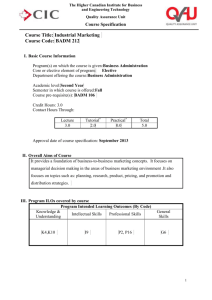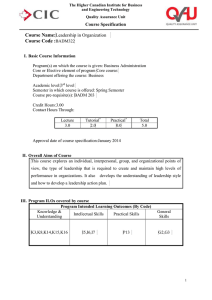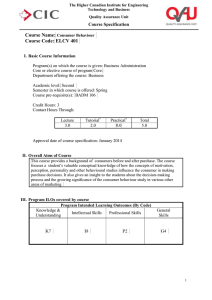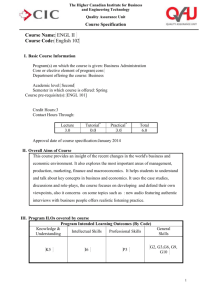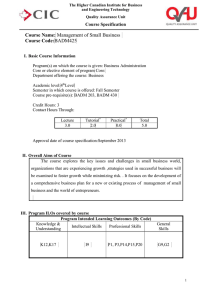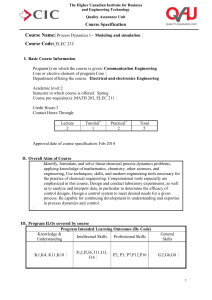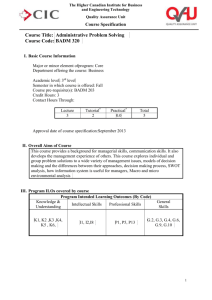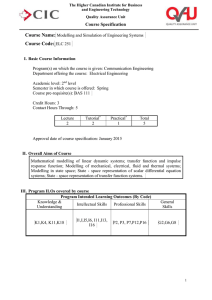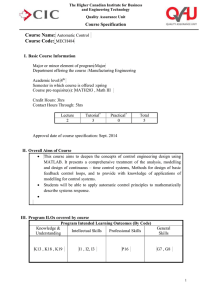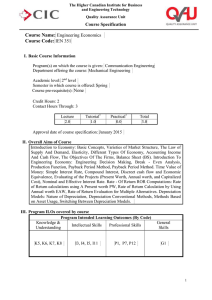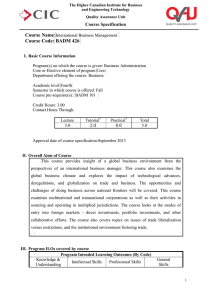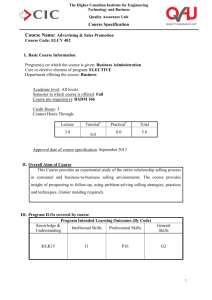COURSE TITLE (COURSE CODE)
advertisement
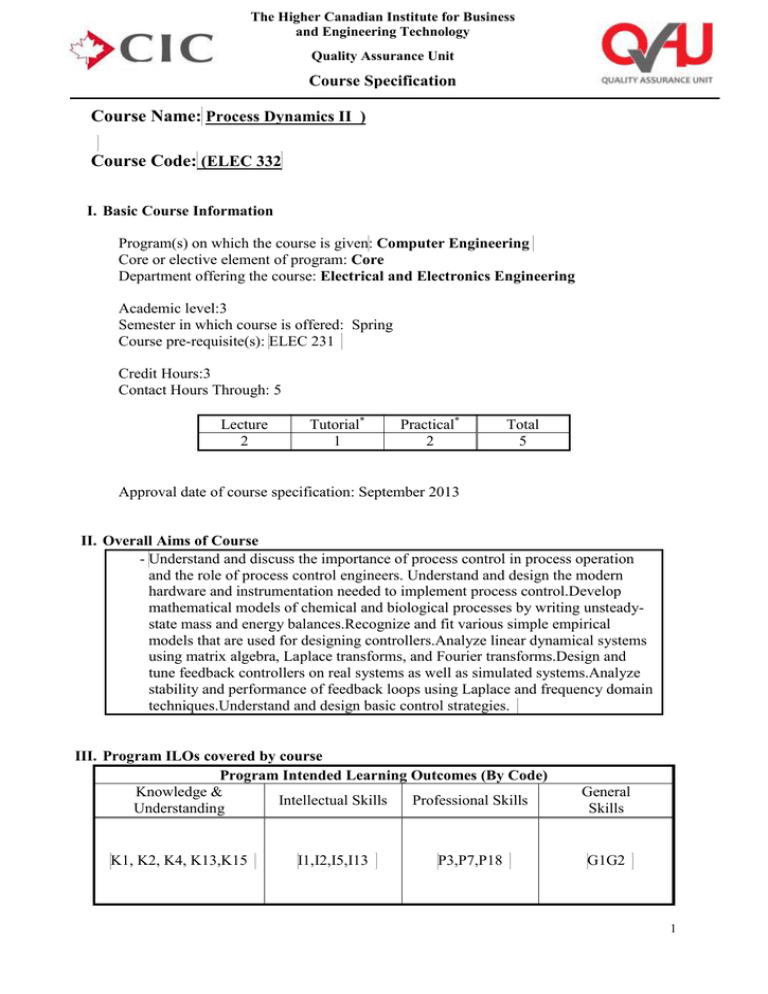
The Higher Canadian Institute for Business and Engineering Technology Quality Assurance Unit Course Specification Course Name: Process Dynamics II ) Course Code: (ELEC 332 I. Basic Course Information Program(s) on which the course is given: Computer Engineering Core or elective element of program: Core Department offering the course: Electrical and Electronics Engineering Academic level:3 Semester in which course is offered: Spring Course pre-requisite(s): ELEC 231 Credit Hours:3 Contact Hours Through: 5 Lecture 2 Tutorial* 1 Practical* 2 Total 5 Approval date of course specification: September 2013 II. Overall Aims of Course - Understand and discuss the importance of process control in process operation and the role of process control engineers. Understand and design the modern hardware and instrumentation needed to implement process control.Develop mathematical models of chemical and biological processes by writing unsteadystate mass and energy balances.Recognize and fit various simple empirical models that are used for designing controllers.Analyze linear dynamical systems using matrix algebra, Laplace transforms, and Fourier transforms.Design and tune feedback controllers on real systems as well as simulated systems.Analyze stability and performance of feedback loops using Laplace and frequency domain techniques.Understand and design basic control strategies. III. Program ILOs covered by course Program Intended Learning Outcomes (By Code) Knowledge & Intellectual Skills Professional Skills Understanding K1, K2, K4, K13,K15 I1,I2,I5,I13 P3,P7,P18 General Skills G1G2 1 The Higher Canadian Institute for Business and Engineering Technology Quality Assurance Unit Course Specification IV. Intended Learning Outcomes of Course (ILOs) a. Knowledge and Understanding k.1–Demonstrate competence in university level mathematics, natural sciences, engineering fundamentals, and specialized engineering knowledge appropriate to the program. k.2– Relate practical application of theories in different fields through projects and field studies k.3- Identify, analyzing and design of control systems with performance evaluation. k4. The signal processing applications in the dynamics systems. k5. Identify the elements and circuits design for control system applications. b. Intellectual/Cognitive Skills i.1 Use appropriate knowledge and skills to identify, formulate, analyze, and solve complex engineering problems in order to reach substantiated conclusions. i.2Use brainstorming and innovation techniques to deal with problems and to develop new ideas i.3- Solve and investigate complex problems by methods that include appropriate experiments, analysis and interpretation of data, and synthesis of information in order to reach valid conclusions. i.4- demonstrate and organize tasks into a structured form c. Practical/Professional Skills P.1 Formulate and use the appropriate mathematical methods for modeling and analyzing problems in electrical, electronic and communications engineering. P.2 - set up and use the relevant test and measurement equipment and experimental laboratory work P.3 Design the systems, components and processes and test the design ideas in the laboratory or through simulation, with technical analysis and critical evaluation of results. d. General and Transferable Skills g.1- Manipulate, sort and present the information in a variety of ways g.2- Use the scientific evidence based methods in the solution of problems g.3- Express creativity and innovation in problem solving and working with limited or contradictory information V. Course Matrix Contents Main Topics / Chapters 1- Introduction process control 2345- Elements of a process control system Process control loop and transfer function General requirements of a control system Intuitive approach to process control concepts 2 Course ILOs Covered by Topic (By ILO Code) K&U I.S. P.S. G.S. k1 i1 p1 g1 2 k1,k2 i2 2 k3 i2 p1,p2 2 k1,k2 i3 P2 2 k1,k2, k3 i2,i3 p2,p3 Duration (Weeks) g2 g1,g2 g3 2 The Higher Canadian Institute for Business and Engineering Technology Quality Assurance Unit Course Specification 6- Applications to process control 2 Net Teaching Weeks 12 VI. Course Weekly Detailed Topics / hours / ILOs Week No. 1 2 3 4 5 6 7 8 9 10 11 12 13 14 k3 i2,i3,i4 Total Hours Sub-Topics 2 Block diagram of Hydraulic Systems 5 Block diagram of Liquid, Systems 5 Block diagram of Thermal Systems 5 Elements of a process control system 5 Testing of Process Control 5 Midterm Exam Introduction process control General requirements of a Hydraulic process control system General requirements of a Liquid process control system General requirements of a Thermal process control system Measurments of process control systems Intuitive approach to process control concepts Applications to process control Analyze stability and performance of feedback loops 15 p1,p2.p3 Contact Hours Theoretical Practical Hours Hours* 2 2 3 2 3 2 3 2 3 2 3 5 2 3 5 2 3 5 2 3 5 2 3 5 2 3 5 2 3 5 2 3 Final Exam Total Teaching Hours Teaching/Learning Method Lectures & Seminars Tutorials Computer lab Sessions Practical lab Work Reading Materials Web-site Searches Research & Reporting Problem Solving / Problem-based Learning Projects Independent Work Group Work Case Studies Presentations Selected Method VII. Teaching and Learning Methods √ √ √ √ Course ILOs Covered by Method (By ILO Code) K&U All All Intellectual Skills All All Professional Skills All All General Skills All All √ All √ All √ All √ All All 3 The Higher Canadian Institute for Business and Engineering Technology Quality Assurance Unit Course Specification Simulation Analysis Others (Specify): Selected Method VIII. Assessment Methods, Schedule and Grade Distribution Course ILOs Covered by Method (By ILO Code) Assessment Method K&U I.S. P.S. G.S. Midterm Exam Final Exam Quizzes Course Work Report Writing Case Study Analysis Oral Presentations Practical Group Project Individual Project √ √ √ √ √ All All All √ √ √ All All All Assessment Weight / Percentage Week No. 20% 50% 5% 5% 5% 7 16 2,5,12,14 15 4,10 5% 12 5% 5% 2-15 14 Others (Specify): IX. List of References Essential Text Books Course notes Recommended books Periodicals, Web sites, etc … Modern Control Engineering, Katsuhiko Ogata, Prentice Hall (Pearson) – 4th ed. Lecture notes Linear Control system analysis and design, D'azzo,1988 www.prenhall.com X. Facilities required for teaching and learning List the facilities required PC-Computer Data show White Board Marker Course coordinator: Dr. Nahal El Araby Head of Department: Ass. Prof. Dr. Tamer Abd El Rahman Date: September 2013 4
